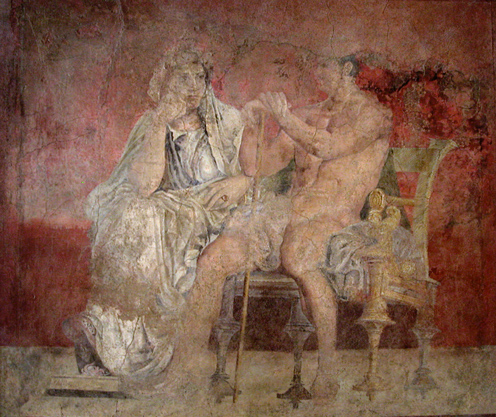 Mural of wedded couple, villa of P. Fannius Synistor, Boscoreale (50-40 BCE) |
Clodia Metelli (born c. 97 BCE) was one of three
sisters, all Clodias, born into the powerful and influential
gens
Claudia, identified by the addition of their husband's name (see
names). She is numbered among the elite "new" women of the
late Republic (notably Sempronia, Fulvia, Julia); educated, wealthy, freely in
the public eye, they are portrayed in contemporary prose texts as negative
exempla for their rejection of the confining role of the
materfamilias. Clodia married her cousin, Quintus Caecilius
Metellus Celer (consul 60 BCE); after his suspicious death in 59 she never
remarried. Scholars question whether historic women created the template of the
imperious beloved of elegiac love poetry (as Clodia is claimed to be Catullus'
Lesbia) or were influenced by it (as Augustus' daughter Julia may have been by
Ovid's poetry). In this passage from
Cicero's oration for the defense,
Pro
Caelio (April 3-4, 56 BCE), Clodia's distinguished
ancestor Appius Claudius Caecus reprimands her for
being an unmarried widow in her 30's, living alone without male supervision and
notorious for conduct that compromised the family name. After 56 BCE Clodia disappeared
from the public record. |
Section XIV.33: Cicero dramatically pretends not to interrogate Clodia himself, but instead calls up from the dead her famous ancestor, Appius Claudius Caecus, a stern moralist and statesman, to chastise her.
| Sed tamen ex ipsa quaeram prius utrum me secum severe et graviter et prisce agere malit an remisse et leniter et urbane. | |
| Si illo austero more ac modo, aliquis mihi ab inferis excitandus est ex barbatis illis non hac barbula, qua ista delectatur, sed illa horrida, quam in statuis antiquis atque imaginibus videmus, qui obiurget mulierem et pro me loquatur, ne mihi ista forte suscenseat. | |
| Exsistat igitur ex hac ipsa familia aliquis ac potissimum Caecus ille; minimum enim dolorem capiet, qui istam non videbit. |
Section XIV.34: Cicero's Caecus compares Clodia's rumored conduct and her associates to the virtuous men and women of the Claudii who made their gens famous and to her most worthy deceased husband, Metellus.
| Qui profecto, si exstiterit, sic aget ac sic loquetur: "Mulier, quid tibi cum Caelio, quid cum homine adulescentulo, quid cum alieno? | |
| Cur aut tam familiaris huic fuisti, ut aurum commodares, aut tam inimica, ut venenum timeres? | |
| Non patrem tuum videras, non patruum, non avum, non proavum, non abavum, non atavum audieras consules fuisse; non denique modo te Q. Metelli matrimonium tenuisse sciebas, clarissimi ac fortissimi viri patriaeque amantissimi, qui simul ac pedem limine extulerat, omnes prope cives virtute, gloria, dignitate superabat? | |
| Cum ex amplissimo genere in familiam clarissimam nupsisses, cur tibi Caelius tam coniunctus fuit? | |
| Cognatus, adfinis, viri tui familiaris? Nihil eorum. Quid igitur fuit nisi quaedam temeritas ac libido? | |
| Nonne te, si nostrae imagines viriles non commovebant, ne progenies quidem mea, Q. illa Claudia, aemulam domesticae laudis in gloria muliebri esse admonebat, non virgo illa Vestalis Claudia, quae patrem complexa triumphantem ab inimico tribuno plebei de curru detrahi passa non est? | |
| Cur te fraterna vitia potius quam bona paterna et avita et usque a nobis cum in viris tum etiam in feminis repetita moverunt? | |
| Ideone ego pacem Pyrrhi diremi, ut tu amorum turpissimorum cotidie foedera ferires, ideo aquam adduxi, ut ea tu inceste uterere, ideo viam munivi, ut eam tu alienis viris comitata celebrares?" | |
Click on the underlined words for translation aids and
commentary, which will appear in a small window. Click on the
![]() icon link to the
right of the poem for related images and information. Close the small window
after each use.
icon link to the
right of the poem for related images and information. Close the small window
after each use.